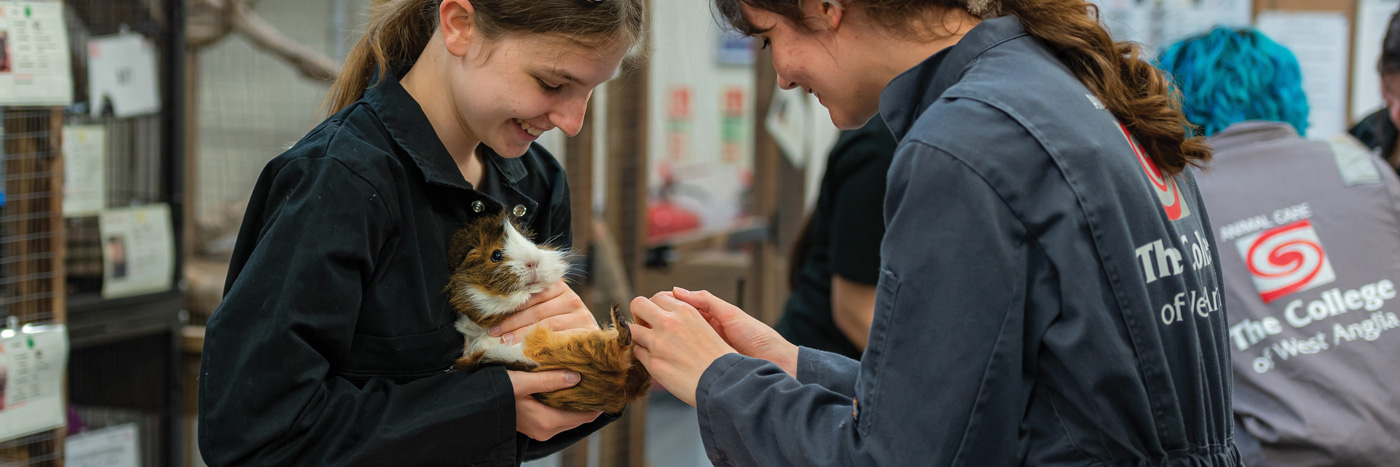Get insights into where our courses can lead you. See example work tasks and find real job vacancies.
Veterinary nurses
£27,000
Potential Salary
Animal care services occupations n.e.c
£24,000
Potential Salary
Veterinarians
£46,000
Potential Salary
Add courses to your basket to apply for more than one
You have not added any courses yet.





Animal Care
Higher Education (UcWA)Our degree in Bioveterinary Science is a great option for those wishing to progress into animal or veterinary sciences. Students will have access to all of our specialist facilities at our Cambridge campus. This degree is currently subject to validation.
Get insights into where our courses can lead you. See example work tasks and find real job vacancies.
Veterinary nurses
£27,000
Potential Salary
Animal care services occupations n.e.c
£24,000
Potential Salary
Veterinarians
£46,000
Potential Salary
The purpose of this three-year honours degree programme is to provide the student with a wide subject knowledge related to biological and veterinary animal sciences, with practical and transferable skills for careers allied to veterinary science, laboratory, scientific research, farming, animal health and welfare, veterinary physiotherapy, nutrition and the biotechnology and pharmaceutical industries. This programme can also be used as a means for application to study Veterinary Science at UK Veterinary Schools, and for application for postgraduate study in a wide range of subjects.
A mixture of core and optional modules will be offered throughout the programme. The core modules will provide the student with the underpinning knowledge and practical skills that will enable them to enter the industries allied to veterinary science. A choice of optional modules will provide the student with the opportunity to specialise in their chosen route. Practical and industry-based visits will underpin the students academic knowledge, whilst giving them the opportunity to practice and develop practical skills required in the industry. Students will also develop their investigative skills for research, thus enabling the student to specialise in areas of particular interest to them. Students will be taught by qualified veterinary staff and animal scientists who have had experience in the veterinary/laboratory industry and who undertake research in this field of study. Students will have the opportunity to study a wide variety of species, including companion animals, non-traditional companion animals, equine and farm animals. Students will have access to a wide variety of facilities including a clinical skills lab, laboratory, equine therapy centre, equine yard and animal unit
The aim of the programme is to provide the student with a balance of applied and academic study. Academic knowledge and understanding reinforces and supports the development of skills that can be applied to working in this sector, therefore equipping the learner with the ability and knowledge relevant for future employment and to the needs of employers. The student will obtain an awareness of current issues within the animal/veterinary industry and develop an ability to evaluate and analyse the information provided and apply this to help improve the health and welfare of animals.
These are the modules for the last academic year. These are currently under revalidation so some of these modules can be subject to change
Year 1
| Module name | Credits |
|---|---|
| Communication, Problem Based Learning and Study Skills | 15 |
| Animals and Human Society | 15 |
| Animal Husbandry, Health and Disease | 30 |
| Introduction to Life Sciences | 30 |
| Comparative Anatomy and Physiology | 15 |
| Introduction to Animal Nutrition | 15 |
Year 2
| Module name | Credits |
|---|---|
| Diagnostic Techniques | 30 |
| Applied Animal Nutrition | 15 |
| Disease Surveillance and Epidemiology | 15 |
| Introduction to Research | 15 |
| Animal Welfare and Ethics | 15 |
| Equine Science (Optional) | 15 |
| Alternative and Complementary Animal Therapies (Optional) | 15 |
| One Health (Optional) | 15 |
Year 3
| Module name | Credits |
|---|---|
| Undergraduate Major Project (Dissertation) | 30 |
| Development in Animal Management | 15 |
| Pharmacology | 15 |
| Animal Breeding, Welfare and Ethics | 15 |
| Animals and Society II | 15 |
| Applied Animal Welfare and Ethics (Optional) | 15 |
| Animal Cognition and Learning (Optional) | 15 |
| Business Practice (Optional) | 15 |
| Sustainable Farm Animal Production Systems (Optional) | 15 |
3 years
01/09/2025
This course will be delivered at our Cambridge Campus face-to-face across 3 days, with one full day and two half days (days are trimester dependent)
| Academic Year | Fee for the year |
|---|---|
| 25/26 | £9000 |
We set our course fees annually. As students pay a fee for each year of their course, the fees set for future academic years may be higher than those set in the 2024 / 2025 academic year.
For each future academic year of your course of study, your fees may be subject to review and increase on a basis in line with the Retail Prices Index (RPI) plus 3%. RPI is a measure of inflation published monthly by the Office for National Statistics which measures the changes from month to month in the cost of a representative sample of retail goods and services bought by consumers within the UK. This means that your course fees will not be increased each year by more than RPI + 3% from the previous year's fees and will not ever exceed the maximum amount that the government allows higher education institutions to charge students in the related academic year.
Information about course fees and student finance can be found below.
BSc (Hons) in Bioveterinary Science
This course will be assessed using a variety of methods, including written assessments, written exams, practical exams and presentations.
9.5 hours per module per week
The course team includes a mixture of experienced vets, vet nurses and animal scientists. Each member of the team is experienced in the subject that are delivering and has qualifications linked to the subject area.
Every effort to ensure the information on this page is accurate, however there may be scenarios where the college is required to make amend or alter aspects of the programme, college provision or delivery. Should this occur after you have accepted a place at the college, you will be consulted and agreement sought. You will be entitled to withdraw from any obligations to the college, and where relevant receive any refund or compensation, as per your Terms and Conditions and the Student Protection Plan of the relevant validating awarding organisation. More information is available on our Terms page.
More Animal Care Courses
Part-Time
6 Courses
View coursesAccess to Higher Education (19+)
2 Courses
View coursesVocational Courses
14 Courses
View coursesT-level
2 Courses
View coursesHigher Education (UcWA)
1 Course
View course

